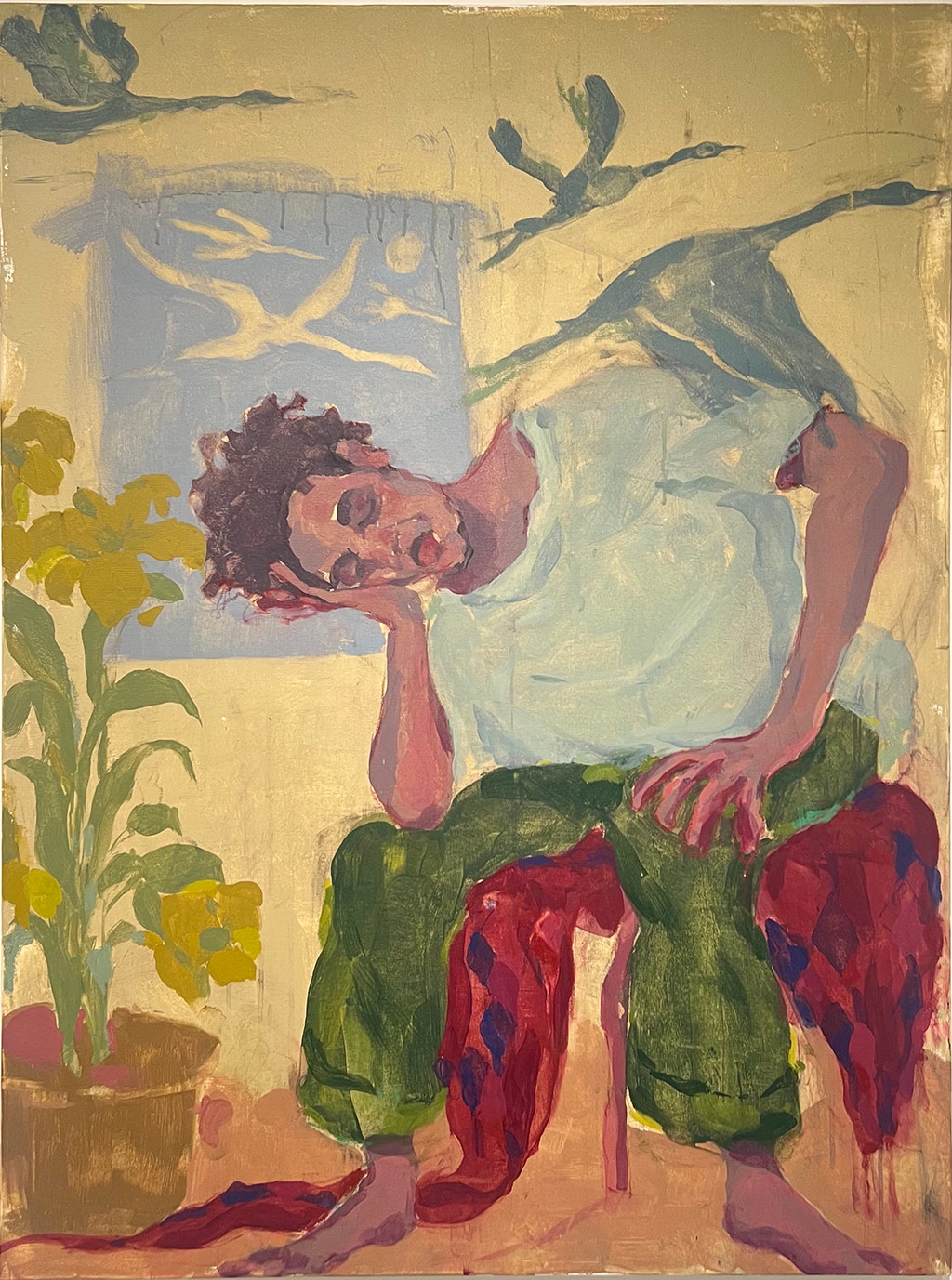
Press photos by Leeay (@le3ay)
BAD PREMONITION Offers a Wake-Up Call
“When I wrote [‘BAD PREMONITION’], I was starting to kind of have these realizations that I had ended up in a situation that I had found myself in before, that was not good for me…” explains Barbosa, who describes the album’s title track as the “first spark” to show her that she was beginning on a new body of work. “I was doing a lot of self-analysis during that time, and kind of having those realizations of like, ‘Oh, damn… these same kind of patterns and cycles keep playing out in my life.'”
In the second verse of “BAD PREMONITION,” Barbosa sings, “Let’s go back to the beginning / Saw the writing on the wall / Got this feeling and it woke me right up / Somebody knocking on my door, hello / And I didn’t wanna listen then.” The lyrics hint to the many times when one might ignore deep-seated intuition to instead find themselves caught up in toxic cycles.
“I started realizing that I had kind of missed all these warning signs, and I’d kind of looked the other way — when maybe there were red flags along the road that I should have listened to,” she explains.
With “BAD PREMONITION,” Barbosa realized that she was getting close to a point where she might “lose control over a lot of things” or end up in “disastrous” territory if she didn’t quickly change her trajectory. Writing the track also opened up the creative floodgates which were previously blocked — and as Barbosa worked on additional songs, the themes on “BAD PREMONITION” continued to remain top-of-mind.
“I feel like we’ve all kind of had those moments in our life where we repeat patterns; we make the same mistakes over and over again, and sometimes we’re… on autopilot. We’re kind of doomed, and we just kind of let it happen,” says Barbosa. “I definitely revisited that idea a little bit in some of the other songs… it was just a strong concept for me.”
Despite the heaviness which inspired “BAD PREMONITION,” however, the album as a whole feels far from tragic, in part due to its subtext of transformation. While there are plenty of references to heartbreak, self-doubt, and sadness, BAD PREMONITION closes, significantly, with “COLOR” — a track which contains brighter instrumental notes and compelled Barbosa to reassess the mood of the EP’s other tracks.
“At one point, I didn’t know if [‘COLOR”] belonged on the EP because I was like, ‘Well, this one sounds so euphoric, and it sounds so cathartic,’ but then I realized the other [songs] needed that,” shares Barbosa. “By the time I was finishing the music and starting this new chapter, I was in such a different place, emotionally, and I was really feeling really empowered… I realized that I didn’t want the EP just to feel like all of this tough stuff… I wanted it to close with something that would feel like reclaiming some joy and some freedom.”

The Reclamation of Joy and Freedom as an Independent Artist
Reclaiming joy and freedom also sees Barbosa making the decision to move away from record labels. In addition to navigating an industry that has changed significantly since she first started her career in 2013, Barbosa describes being constantly compared to other female artists — no matter what genre — and having to temper one’s own creative ambitions in order to fit into the expectations of others.
“I started my career very DIY, self-releasing stuff — and I definitely lost that once I entered the label systems and went through a few different kinds of iterations of what that label scenario looked like. And I was disappointed every time,” she explains. “Losing the ability to decide what I released, and when, and what direction my music was going to take was really hard.”
Such limitations were not necessarily put into place from the very start. Barbosa recalls that following the release of her first record — when scenarios did not play out “the way that a lot of people… wanted that album to go” — she found that her future career was colored by these initial misalignments in expectations.
“I spent years of really having to defend myself and the ideas I had,” she shares. “That process is really exhausting, and… it really, really takes a toll on the creative side, because I think as artists, we’re kind of fundamentally sensitive, and it’s a really delicate thing when you’re creating this product that is you and your feelings.”
“It’s really, really easy, especially early on… to have other people’s opinions or other people kind of second guessing or doubting you, to immediately make you doubt yourself,” she explains.
As an artist, Barbosa has always felt the desire to “just keep going and keep releasing music as often and as possible,” but through the years, she has found that untenable when working with record labels.
“Our rhythms as artists: they can be slow, or they can also be a constant flow — and when you have the constant flow, but then you’re not allowed to put that out into the world… everything stops,” she explains. “I’d release something, and things were kind of happening, and then I would just kind of get stuck for a couple years because I wouldn’t be allowed to release music, essentially. And when you can’t release music it’s incredibly hard to move your career forward as a musician.”
Still, while Barbosa believes it is important for artists to be “vocal and transparent” about the reality of the music industry and “making it” as an artist within such systems, she is also careful to tread the line of not being hung up on her past. Taking the creative reigns back into her own hands is one solution — which allows her to embrace a world of possibilities — including control of her own release schedules.
“[Now] I can say, I made a song yesterday, I am obsessed with it, I love it, and I want to release it — as opposed to, I made the song and I love it, [but] now I have to send it to the label,” says Barbosa. “In my experience, it’s never, ‘We love it; let’s put it out.’ It’s always like, ‘It’s great, but maybe this or maybe that… maybe put a rapper on it… [they’re] just throwing things at you, where you lose that essence of the thing you created.”
“For me, it’s the ability to not have all those opinions thrown my way as to what’s going to make the song more marketable, and just having the freedom to say, ‘This is what I made, and this is how it’s going to be,'” Barbosa continues.
Managing her own artistic career has definitely forced Barbosa to become “more of a business-oriented person,” she admits — but it also allows her the freedom to choose her own collaborators at every stage of the process.
“It’s just a completely different experience, and it feels so liberating and so empowering to be able to kind of be a boss in that way… and creatively, of course, just being able to listen to myself and to the people whose creative input I seek and I want,” says Barbosa.

On BAD PREMONITION, Barbosa collaborated once again with Patrick Wimberly of Chairlift — who mixed Barbosa’s 2015 Verde EP — and Jake Portrait from Unknown Mortal Orchestra, among others. Wimberly and Portrait share Los Angeles studio spaces close to one another and work together frequently in what Barbosa describes as a “fluid” workflow with complementary tendencies — and this sensibility was one they were able to bring to the EP.
To ensure cohesion in her overall vision for her music, Barbosa gave the duo touchpoints, including references to early 2000 productions she loves, such as work by Timbaland and Max Martin, “where things kind of start getting really sampley and kind of electronic-y but… they still have kind of like an aged feeling to them.”
From there, Wimberly and Portrait pulled out their own sonic references — including Britney Spears’ music from that era, which Barbosa also jived with — and their collective brain trust took BAD PREMONITION to another level.
“Everybody that I worked with on the production side really just got on the same page with me,” says Barbosa. “The music would not… be at all what it is, if it weren’t for all the people I worked with.”
Making these decisions for herself, and without the approval of a record label, seem to mean everything to Barbosa at this point in her career. Coming off a recent 6-week tour opening for Kimbra, which she describes as “boot camp,” Barbosa learned to experiment with diverse stage setups and embraced the ability to present different “looks” or “visual characters” every night.
She’s hungry to build on that momentum with much more touring — which will include accompanying visuals and intentionally-designed merch — and describes this new approach as a “family affair.” She is working with long-time friends to create experiences that will be “handpicked and handcrafted” and live show experiences that are comprised of “sloppy, sweaty, rock n’ roll vibes and vocals.”
From self-doubt to breaking free from toxic cycles, it seems that bad premonitions have resulted in good behaviors. The present time marks an empowered new chapter when Barbosa will pay homage to her DIY roots.
“I’m an independent artist at heart, and I think a lot of artists are,” she shares. “To be an artist and to create and to want to put your expressions out into the world and reach people — it’s something that kind of goes hand in hand with creative freedom.”

Ω






